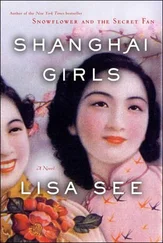Lisa See - Peony in Love
Здесь есть возможность читать онлайн «Lisa See - Peony in Love» весь текст электронной книги совершенно бесплатно (целиком полную версию без сокращений). В некоторых случаях можно слушать аудио, скачать через торрент в формате fb2 и присутствует краткое содержание. Жанр: Старинная литература, на английском языке. Описание произведения, (предисловие) а так же отзывы посетителей доступны на портале библиотеки ЛибКат.
- Название:Peony in Love
- Автор:
- Жанр:
- Год:неизвестен
- ISBN:нет данных
- Рейтинг книги:4 / 5. Голосов: 1
-
Избранное:Добавить в избранное
- Отзывы:
-
Ваша оценка:
- 80
- 1
- 2
- 3
- 4
- 5
Peony in Love: краткое содержание, описание и аннотация
Предлагаем к чтению аннотацию, описание, краткое содержание или предисловие (зависит от того, что написал сам автор книги «Peony in Love»). Если вы не нашли необходимую информацию о книге — напишите в комментариях, мы постараемся отыскать её.
Peony in Love — читать онлайн бесплатно полную книгу (весь текст) целиком
Ниже представлен текст книги, разбитый по страницам. Система сохранения места последней прочитанной страницы, позволяет с удобством читать онлайн бесплатно книгу «Peony in Love», без необходимости каждый раз заново искать на чём Вы остановились. Поставьте закладку, и сможете в любой момент перейти на страницу, на которой закончили чтение.
Интервал:
Закладка:
“The story of Xiaoqing has a lesson for our daughter?” Mama asked.
“Peony was born into one of the finest families in Hangzhou. That other girl was a thin horse, bought and sold like property. One girl is pure. The other was a—”
“I’m aware of Xiaoqing’s profession,” my father cut in. “You don’t need to remind me. But when I speak to our daughter about Xiaoqing, I’m thinking more of the lessons that can be learned from the opera that inspired her. Surely you see no harm in that.”
“No harm? Are you suggesting our daughter’s fate will be like that of Du Liniang?”
I glanced furtively at the servant standing by the door. How long before he reported this—gleefully, probably—to another servant and it spread throughout the compound?
“Peony could learn from her, yes,” Baba answered evenly. “Liniang is ( 3 0 )
fair, her heart kind and pure, her vision farsighted, and her will steadfast and true.”
“Waaa!” Mama responded. “That girl was stubborn in love! How many girls need to die from this story before you see the perils?”
My cousins and I whispered about these unfortunates late at night when we thought no one was listening. We spoke of Yu Niang, who became enamored of the opera at the age of thirteen and died by seventeen, with the text at her side. The great Tang Xianzu, heartbroken at the news, wrote poems eulogizing her. But soon came many many more girls, who read the story, became lovesick like Liniang, wasted away, and died, hoping that true love would find them and bring them back to life.
“Our daughter is a phoenix,” Baba said. “I will see her married to a dragon, not a crow.”
This answer did not satisfy my mother. When she was happy, she could change ice crystals into flowers. When she was sad or angry—as she was now—she could turn dark clouds into swarms of biting insects.
“An overeducated daughter is a dead daughter,” my mother announced. “Talent is not a gift we should wish on Peony. All this reading, where do you think it will end—in nuptial bliss or in disappointment, consumption, and death?”
“I’ve told you before, Peony will not die from words.”
Mama and Baba seemed to have forgotten I was in the room, and I didn’t move for fear they would notice me. Just yesterday I’d heard them argue about this subject. I rarely saw my parents together. When I did, it was for festivals or religious rites in the ancestral hall, where every word and action was set in advance. Now I wondered if they were like this all the time.
“How will she learn to be a good wife and mother if she keeps coming here?” Mama demanded.
“How will she not?” Baba asked, no concern in his voice. To my great surprise and my mother’s disgust, he loosely quoted Prefect Du speaking about his daughter. “A young lady needs an understanding of letters, so that when she marries she will not be deficient in conversation with her husband. And Peony’s role is to be a moral guardian, is it not? You should be happy that she cares little for pretty dresses, new hairpins, or painting her face. While she is lovely, we need to remember that her face is not what distinguishes her. Her beauty is a reflection of the virtue and talent she keeps inside. One day she will offer comfort and solace to her husband ( 3 1 )
through reading to him, but ultimately we are training our daughter to be a good mother—no more, no less. Her role is to teach her daughters to write poetry and perfect their womanly skills. Most of all, she will help our grandson in his studies, until he is old enough to leave the women’s chambers. When he completes his studies, she will have her day of glory and honor. Only then will she shine. Only then will she be recognized.”
My mother could not argue this point; she acquiesced. “Just so long as her reading doesn’t cause her to cross any boundaries. You wouldn’t want her to become unruly. And if you must tell our daughter stories, can’t you tell her of the gods and goddesses?”
When my father wouldn’t agree, Mama’s eyes came to rest on me. She said to my father, “How much longer will you keep her?”
“Just a little while.”
As quietly as she’d come, my mother disappeared. My father had won the argument, I think. At least he didn’t seem particularly perturbed as he made a notation in an account book and then set down his calligraphy brush, got up, and walked to the window to look out to Solitary Island.
A servant came in, bowed to my father, and handed him a sealed letter with an official red chop. My father fingered it thoughtfully, as though he might already know what was written inside. Since he didn’t seem to want to open it with me sitting there, I rose, thanked him again for giving me the edition of The Peony Pavilion, and left the library.
( 3 2 )

Desire
an o t h e r lu s h an d war m n i g h t. i n ou r wo m e n ’s chambers we enjoyed a banquet that included beans dried in spring sunshine and then steamed with dried tangerine peel, and red seventh-month crabs, which were the size of hen’s eggs and available from our local waters only at this time of year. Special ingredients were added to the married women’s dishes to help them get pregnant, while others were left out for those who were or might be with child: rabbit meat, because everyone knows it can cause a hare lip, and lamb, because it can cause a baby to be born ill. But I wasn’t hungry. My mind was already in the Riding-the-Wind Pavilion.
When the cymbals and drums called us to the garden, I lagged behind, doing my best to be gracious and make small talk with my aunts, the concubines, and the wives of my father’s guests. I joined the last group to leave our chambers. Only cushions on the outer edge of the women’s area remained. I took one and looked around to make sure I’d made the right decision. Yes, my mother, as the hostess, sat in the middle of the group.
Tonight all the unmarried girls but me had been clustered together. Tan Ze—whether of her own accord or because my mother had insisted on it—had been relegated to the section with girls her own age.
Once again my father had chosen highlights for this evening’s performance, which began three years after Du Liniang’s death with the scholar Liu Mengmei falling ill on his long journey to take the imperial exams. Liniang’s old tutor gives Mengmei shelter at her shrine near the ( 3 3 )
plum tree. As soon as the next piece of music started, I could tell that we’d gone with Liniang to the afterworld for Infernal Judgment. Since tonight I couldn’t see the performers, I had to imagine the judge, fearful in his aspect, as he talked about reincarnation and how souls scatter like sparks from a firecracker. They’re sent to any of 48,000 fates in the realms of desire, of form, and of the formless, or to one of the 242 levels of Hell. Liniang pleaded with the judge, telling him a terrible mistake had been made, for she was too young to be there, had neither married nor drunk wine, but had fallen into longing and then lost her life.
“When in the world did anyone die from a dream?” The judge’s voice tore into me as he demanded an explanation from the Flower Spirit, who had brought about Liniang’s lovesickness and death. Then, after checking the Register of Marriages, he determined that indeed Liniang had been destined to be with Mengmei, and—since her ancestor tablet hadn’t been dotted—granted her permission to wander the world as a ghost in search of the husband she’d been fated to marry. After this, he charged the Flower Spirit with keeping Liniang’s physical body from decaying. As a ghost, Liniang returned to the earthly realm to live near her tomb under the plum tree. When Sister Stone, the old nun charged with caring for the tomb, made offerings on a table under the tree, Liniang was so grateful that she scattered plum blossoms into which she infused her loving thoughts.
Читать дальшеИнтервал:
Закладка:
Похожие книги на «Peony in Love»
Представляем Вашему вниманию похожие книги на «Peony in Love» списком для выбора. Мы отобрали схожую по названию и смыслу литературу в надежде предоставить читателям больше вариантов отыскать новые, интересные, ещё непрочитанные произведения.
Обсуждение, отзывы о книге «Peony in Love» и просто собственные мнения читателей. Оставьте ваши комментарии, напишите, что Вы думаете о произведении, его смысле или главных героях. Укажите что конкретно понравилось, а что нет, и почему Вы так считаете.












